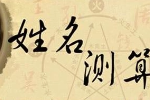本文目录导读:
- The Significance of Names in Ancient Times
- The Principles of Name Testing
- Methods of Name Testing
- Historical Cases and Modern Applications
- Conclusion

In the vast expanse of human history, the art of naming has played a pivotal role in shaping identities, traditions, and even fates. Names, as symbols of individuality, carry deep cultural and psychological significance. In this article, we delve into the ancient art of name testing, exploring the principles of name selection and the hidden meanings behind them. We will examine how the choice of a name can influence one's destiny, both in the eyes of tradition and in the modern world.
The Significance of Names in Ancient Times
Names have been more than mere labels for individuals in ancient times. They were symbols of identity, status, and even destiny. In many cultures, the name was chosen with great care, reflecting the aspirations, personality, and future hopes of the person. For example, in ancient China, the name was often selected based on the person's birth date, as the zodiac signs were believed to influence one's destiny. The choice of a name was not just a personal matter but also a reflection of the family's wishes and the cultural values of the time.
Names also held spiritual significance. In many cultures, names were thought to resonate with the deities and the coos. The letters of a name were believed to have a profound impact on the person's life, influencing their fortune, health, and relationships. This belief in the power of names led to the development of name testing, a practice that has endured for centuries.
The Principles of Name Testing
The principles of name testing are rooted in the belief that names have a profound impact on a person's life. The selection of a name is seen as a way to align one's destiny with their aspirations and to bring harmony and prosperity. The principles of name testing vary across cultures, but some common elements include:
-
Balance of Opposites: In many cultures, the balance of yin and yang is considered a fundamental principle of life. A name is often tested to ensure that it contains a balance of these opposites, such as male and female elements, light and dark, or hard and soft.
-
Avoidance of Forbidden Combinations: Certain combinations of letters are considered unlucky and are avoided in names. For example, in Chinese culture, the combination of the letters "死" () and "命" (destiny) is considered particularly unlucky.
-
Harmony with the Name of the Deity: Names are often tested to ensure that they resonate with the name of the deity or the spirit of the person being named. This is seen in practices like the "three-line test," where the name is written in three lines and compared to the name of the deity.
-
Significance of Sounds and Meanings: The sounds and meanings of names are also considered in name testing. For example, a name that starts with a consonant is often considered more masculine, while a name that starts with a vowel is considered more feminine. The choice of a name is also influenced by the sounds and rhythm of the name, as well as its meaning in the language.
Methods of Name Testing
There are many methods of name testing, each with its own set of rules and principles. Some of the most common methods include:
-
The Three-Line Test: This is a traditional method of name testing used in many cultures. The name is written in three lines, and the resulting pattern is compared to the name of the deity or the spirit of the person being named. The goal is to achieve a harmonious balance between the lines.
-
The Five-Element Test: This method is based on the five elements of traditional Chinese philosophy: wood, fire, earth, metal, and water. The name is tested to ensure that it contains a balance of these elements, which are believed to influence a person's destiny.
-
The Sound and Meaning Test: This method focuses on the sounds and meanings of the name. The name is tested to ensure that it has a pleasant sound and a positive meaning. For example, a name that is too harsh or negative is considered unlucky.
-
The Date of Birth Test: In many cultures, the name is tested against the person's date of birth. The combination of the name and the date of birth is believed to influence the person's destiny and personality.
Historical Cases and Modern Applications
The practice of name testing has a long and storied history. It can be seen in the names of ancient leaders, such as Confucius, whose name is believed to bring good fortune to his descendants. Similarly, the name of the Chinese emperor is carefully chosen to reflect the will of the deities and the hopes for the future.
In the modern world, name testing continues to be a popular practice, particularly in China and other parts of Asia. Names are often tested against the person's date of birth, as well as other factors, to ensure that they are lucky and harmonious. The practice is also popular in the West, where it is known as name compatibility testing.
In addition to its traditional uses, name testing has also found modern applications in the fields of psychology and sociology. Researchers have studied the impact of names on people's lives, including their self-esteem, happiness, and success. The findings of these studies have led to the development of name testing software, which can help people choose names that are likely to bring them good fortune and happiness.
Conclusion
The art of name testing is a reflection of the deep cultural and psychological significance of names. Names are more than just labels; they are symbols of identity, destiny, and hope. The principles of name testing are rooted in the belief that names have a profound impact on a person's life, and that the right name can bring harmony, prosperity, and happiness.
In conclusion, the choice of a name is a deeply personal and spiritual decision, and it is important to choose a name that reflects the person's values, aspirations, and hopes. By understanding the principles of name testing and the significance of names, we can make more informed decisions about the names we choose, and we can honor the traditions and beliefs of our culture.
相关阅读:





